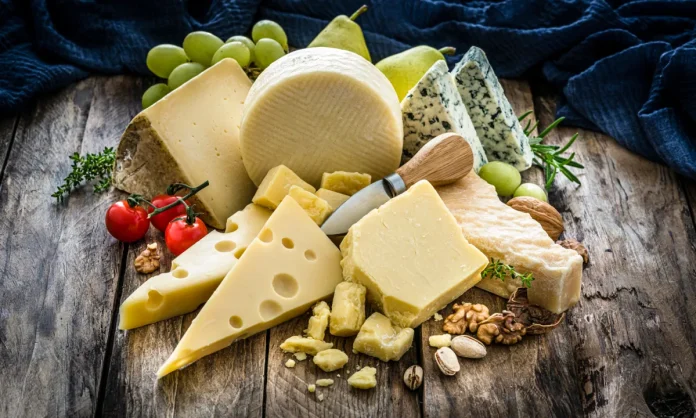Anecdotal claims that eating cheese before bed causes nightmares were once so common that in 2005, the British Cheese Board sponsored a study to investigate this phenomenon. During the week-long experiment, 200 volunteers (100 women and 100 men) reported the types of cheese they consumed before bed and described their dreams. Although the study, more of a public relations effort than scientific research, was never published in a peer-reviewed journal, the findings were intriguing: Stilton cheese was linked to bizarre dreams, including one where a vegetarian crocodile wanted to eat human children. In contrast, Cheddar was associated with dreams about celebrities.
A century earlier, American cartoonist Winsor McCay featured cheese as an antagonist in his early 20th-century comic strip, “Dream of the Rarebit Fiend.” In this series, characters often experienced strange and sometimes nightmarish dreams after consuming Welsh rarebit, a mildly spicy cheese toast.
Recently, a study published in June in the journal Frontiers in Psychology provided insights into why certain foods might lead to more unsettling sleep. In a survey of 1,000 participants, it was found that nightmares after consuming cheese or dairy products were much more common among individuals who are lactose intolerant. This makes sense, as experiencing discomfort while sleeping can influence dreams. According to Tore Nielsen, the study’s lead author and a neuroscientist at Université de Montréal who specializes in dreams and nightmares, “We know that pain influences dreams. Other body sensations—like just touching a dreaming person—can also enter into their dreams. These pathways for influencing dreams definitely exist.”
How scientists studied certain foods and dreams
In 2015, Nielsen published his first paper examining the relationship between food and nightmares. He surveyed 396 university students, asking whether they believed specific foods contributed to bizarre or disturbing dreams. Almost 18 percent of the respondents indicated that food did play a role, with dairy and cheesy dishes—such as pizza and poutine (the study was conducted in Canada)—identified as the primary culprits.
In his recent study, Nielsen found a much smaller overall relationship between food and dreams. Only 5.5 percent of those surveyed reported that their dreams or nightmares were caused by food. “But that’s only part of the results,” Nielsen explained. “We don’t really know how accurately these participants can detect specific cause-and-effect relationships. This is just an impression, which may be based on folklore, mythology, or even things they’ve picked up previously. For example, someone might think, ‘I ate something late, so I’m going to have bad dreams.'”
However, when researchers analyzed data related to gastrointestinal symptoms—such as bloating, gas, diarrhea, cramps, and pain—they found a significant link: lactose-intolerant participants who experienced the worst gastrointestinal symptoms also reported having the worst nightmares.
The study authors also collected data using what Nielsen refers to as a “style of eating questionnaire.” They discovered that nightmares were correlated with not paying attention to feelings of satiety and relying on the clock rather than hunger signals to decide when to eat. “Ignoring those bodily signals, in particular, was associated with having nightmares,” Nielsen said.
The general eating habits that affect sleep
In addition to the usual suspects—caffeine and alcohol—highly processed foods, sugar, and refined carbohydrates can interfere with a good night’s sleep, say Marie-Pierre St-Onge, director of the Center of Excellence for Sleep and Circadian Research at Columbia University. Her research has shown that eating more fruits and vegetables can lead to less fragmented sleep, while more fiber, whole grains, and nuts are helpful for better sleep overall. Low-fibre diets and diets high in saturated fat, on the other hand, are associated with lighter, less restorative sleep with more frequent arousals.
And while a poor diet can cause poor sleep, too little sleep can make it more challenging to maintain diet, according to research by Erica Jansen, a nutritional epidemiologist at the University of Michigan. “When you bring people into the lab and deprive them of sleep, whether that’s a whole night of sleep deprivation or you limit their sleep to four or five hours, they eat differently the next day,” she says.
“They eat more calories. They have higher cravings for energy-dense foods. They choose to eat more refined carbs, more fats.“ The mechanisms behind this aren’t clear, but Jansen says that hormones, such as leptin and ghrelin, which are known to influence appetite, are altered by poor sleep. If an unhealthy diet leads to poor sleep, does it have anything to do with nightmares? Maybe.
Jansen speculates that waking up more frequently, a pattern associated with foods like cheese that are high in saturated fat, can disrupt the balance between REM (rapid eye movement) and non-REM sleep. Most dreaming is done during REM sleep, and you’re more likely to remember a dream if you wake up in the middle of it, says Jansen: “I think that one possible mechanism could be that people are waking up more, so therefore they’re remembering their dreams more.”
Why did cheese take the blame
If bad dreams are caused by a generally poor diet, and the nightmarish effect of cheese is limited mostly to the lactose intolerant, how did cheese get such a bad reputation?
Lucy Long, academic folklorist, director of the non-profit educational group Center for Food and Culture, and author of The Food and Folklore Reader, speculates that the association between cheese with nightmares is a relatively niche and recent belief. The idea that cheese is responsible for bad sleep is not common in many cultures, and on the contrary, warm milk is often thought to ensure peaceful sleep, she says.
“When people say, ‘Oh, it’s folklore,’ sometimes it’s actually something that was created in popular culture or by marketing.” It’s possible that the idea that cheese causes nightmares simply owes its popularity to Winsor McCay and his Rarebit Fiend.
Source: www.nationalgeographic.com


